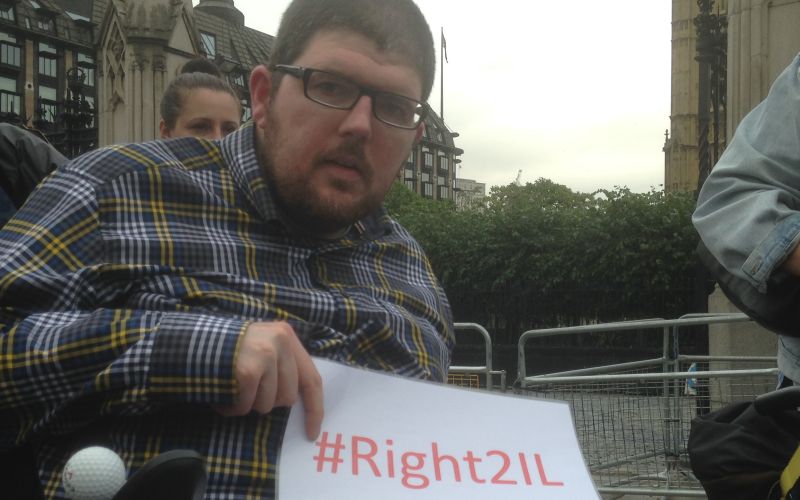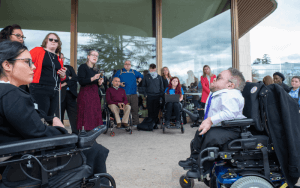The Welsh government has completely ignored the social care funding crisis in a new action plan aimed at ensuring disabled people’s right to independent living.
A public consultation process with disabled people and disability organisations led to “multiple calls” for increased social care funding.
But the final version of the Labour government’s framework and action plan on the right to independent living – which includes 55 actions – says nothing about the funding crisis or the need for more spending on adult social care.
This contrasts with its 2013 framework, which it replaces and which included lengthy sections on access to social care, direct payments and personalised support.
In discussing the engagement process, which took place in 2017, with further engagement late last year on a draft version of the framework, the document says: “We heard that cuts to social care provision have led to lower allocations for Direct Payments which means disabled adults and young people are becoming increasingly isolated and impact to their well-being compromised.”
It also admits that there were “multiple calls for increased funding for health and social care” during that process.
But despite those calls, not one of the 55 actions in the plan mentions social care funding, or the need to address the cuts.
Instead, the action plan details wider measures around independent living, including: barriers to employment; recruitment of disabled apprentices; a review of funding for housing adaptations; collecting evidence on disability poverty; and improving access to health services.
It also includes a planned review of the disabled students’ allowance system; a pledge to improve understanding of the social model of disability across the Welsh government; and action on access to public transport.
There is also a pledge to introduce a scheme in Wales to provide financial support for the extra costs of disabled people seeking election to local councils, to match schemes in Scotland and England.
Nathan Lee Davies (pictured), a leading disabled campaigner who has helped secure concessions from the Welsh government on the impact of the closure of the Independent Living Fund (ILF), said the omission was “bemusing” and appeared to be a “major step backwards”.
A spokesperson for the Welsh government refused to comment on the failure to mention cuts to social care funding in the action plan.
But Jane Hutt, the Welsh government’s deputy minister and chief whip, who has responsibility for equality issues, said in announcing the new framework that “supporting people to live their lives in the way they choose is the right thing to do”.
She said the framework sets out how the government was fulfilling its obligations under the UN Convention on the Rights of Persons with Disabilities (UNCRPD).
But the failure of the action plan to suggest any measures to address the funding crisis and cuts to support suggests the Welsh government could be in breach of the convention’s article 19.
Article 19 says that governments signed up to the convention should take “effective and appropriate measures” to enable disabled people to live in the community with “full inclusion and participation”.
Despite this omission, the framework pledges to “work for continuous improvement in how Wales fulfils its obligations with regard to [UNCRPD] and the Rights of the Child”.
There is also no mention in the document of ILF, and the Welsh government’s decision to close its interim Welsh Independent Living Grant (WILG) scheme, which it had been running as a stopgap with UK government transition funding since ILF closed in June 2015.
WILG closed on 31 March 2018, when the £27 million a year funding provided by the UK government to maintain support to former ILF recipients transferred to local authorities in Wales.
Because of the WILG closure, Welsh local authorities are now solely responsible for meeting the support needs of all former ILF-recipients.
More than 1,200 former ILF recipients will now have their needs met through council funding, while 50 of them have requested an independent assessment of their new support package, a process being funded by the Welsh government following a campaign led by Davies over concerns about post-WILG support.
A Welsh government spokesperson said: “The Welsh Independent Living Grant was introduced as an interim measure to support people who received payments from the UK government’s Independent Living Fund which closed in 2015.
“Our new framework focusses on the future of independent living in Wales, and what Welsh government can do to support disabled people going forward.”
Davies said: “On the face of it the new framework that has been introduced by the Welsh government, following a lengthy consultation process, is as bemusing as it was when [the draft version] was originally launched last year.
“It seems as if I wasted my breath at two consultation days as many of the failings of the framework that I highlighted have failed to be addressed in a [document] that does not seem to address the needs of disabled people with high support needs.
“Social care does not seem to be addressed at all. This is an absolutely bizarre situation when discussing a framework supposedly designed to promote independent living for disabled people.
“Not one of the 55 actions in the action plan mentioned social care funding, which is extremely worrying.”
He added: “After achieving success with the #SaveWILG Campaign – where former ILF recipients have been offered the opportunity of an independent assessment if they disagreed with the decision of the local authority, all funded by the Welsh government – it was hoped that this would signal a change in attitude going forward.
“The dynamic brand of 21st century socialism introduced by first minister Mark Drakeford has delivered positive change that deserves to be recognised.”
But he said the new framework and action plan “seems like a major step backwards”.
He added: “It just seems that the socialist values that the Welsh government demonstrated with their reaction to the WILG campaign have not been utilised in the new framework.
“It does not sit well with me to criticise this new [document], but the fact that it seems to blatantly flaunt the UNCRPD article 19 is a major cause for concern.
“It would be very easy for me to ignore this as WILG recipients have now been protected, but as a disabled activist I remain vigilant to the needs of my disabled brothers and sisters across Wales.
“All disabled people with high support needs should be able to access adequate social care and I will not rest until justice prevails for those in need.”
Rhian Davies, chief executive of Disability Wales (DW), who led the national steering group on the framework, welcomed its publication, particularly “the renewed commitment to implementation of the [UNCRPD] and consideration of options to incorporate this and other UN treaties in Welsh law together with a stronger focus on the social model of disability and proposals to tackle the disability employment gap and support disabled people to take up positions in public life.”
But she added: “Some aspects of the action plan are stronger and more developed than others, often in those areas where disabled people have been closely involved in informing and influencing policy.
“With regard to social care, there appear to be relatively few initiatives cited in the action plan compared with other policy areas.
“Key issues raised during the consultation are omitted, including low take-up of direct payments, provision of advocacy services, WILG developments and the impact of austerity on social care as a whole.
“We understand that the action plan is a work in progress so DW will continue to press for these issues to be addressed, including through Welsh government’s Disability Equality Forum which plays a vital role in monitoring implementation of the framework.”
A note from the editor:
Please consider making a voluntary financial contribution to support the work of DNS and allow it to continue producing independent, carefully-researched news stories that focus on the lives and rights of disabled people and their user-led organisations.
Please do not contribute if you cannot afford to do so, and please note that DNS is not a charity. It is run and owned by disabled journalist John Pring and has been from its launch in April 2009.
Thank you for anything you can do to support the work of DNS…

 UN’s ‘damning verdict’ is ‘vindication’ of fightback against government’s rights violations
UN’s ‘damning verdict’ is ‘vindication’ of fightback against government’s rights violations Sunak’s ‘chilling, threatening’ speech on benefits ‘demonised disabled people’
Sunak’s ‘chilling, threatening’ speech on benefits ‘demonised disabled people’ Letter from DPOs accuses care cuts council of ‘inhumane’ policies
Letter from DPOs accuses care cuts council of ‘inhumane’ policies